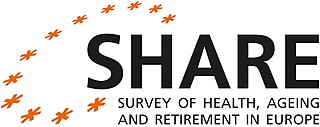Related Research Articles

The Department for Education and Skills (DfES) was a United Kingdom government department between 2001 and 2007, responsible for the education system as well as children's services in England.

The Survey of Income and Program Participation (SIPP) is a statistical survey conducted by the United States Census Bureau.

The Department for Work and Pensions (DWP) is the British Government department responsible for welfare, pensions and child maintenance policy. As the UK's biggest public service department it administers the State Pension and a range of working age, disability and ill health benefits to around 20 million claimants and customers. It is the second largest governmental department in terms of employees, and the largest in terms of expenditure (£187bn).
The General Social Survey (GSS) is a sociological survey created and regularly collected since 1972 by the National Opinion Research Center at the University of Chicago. It is funded by the National Science Foundation. The GSS collects information and keeps a historical record of the concerns, experiences, attitudes, and practices of residents of the United States.
The National Longitudinal Surveys (NLS) are a set of surveys sponsored by the Bureau of Labor Statistics (BLS) of the U.S. Department of Labor. These surveys have gathered information at multiple points in time on the labor market experiences and other significant life events of several groups of men and women. Each of the NLS samples consists of several thousand individuals, many of whom have been surveyed over several decades.
The Family Resources Survey (FRS) is one of the United Kingdom’s largest household surveys. It is carried out by the Office for National Statistics (ONS) with the National Centre for Social Research (NatCen), and Northern Ireland Statistics and Research Agency (NISRA) on an annual basis, by collecting information on the incomes and characteristics of private households in the United Kingdom. It is sponsored by the Department for Work and Pensions (DWP).

The Survey of Health, Ageing and Retirement in Europe (SHARE) is a multidisciplinary and cross-national panel database of micro data on health, socio-economic status and social and family networks. In seven survey waves to date, SHARE has conducted approximately 380,000 interviews with about 140,000 individuals aged 50 and over. The survey covers 28 European countries and Israel.
The English Longitudinal Study of Ageing (ELSA) is a longitudinal study that collects multidisciplinary data from a representative sample of the English population aged 50 and older. The study started in 2002 and there are currently 9 waves of completed data and an tenth wave is currently being collected. The survey data are designed to be used for the investigation of a broad set of topics relevant to understanding the ageing process. Both objective and subjective data are collected covering themes such as health trajectories, disability and healthy life expectancy, the determinants of economic position in older age; the links between economic position, physical health, cognition and mental health; the nature and timing of retirement and post-retirement, labour market activity; household and family structure, social networks and social supports; patterns, determinants and consequences of social, civic and cultural participation and predictors of well-being. ELSA is led by Professor Andrew Steptoe and is jointly run by teams at University College London (UCL), the Institute for Fiscal Studies (IFS), National Centre for Social Research, University of Manchester and the University of East Anglia.
Understanding Society, the UK Household Longitudinal Study (UKHLS), is one of the largest panel survey in the world, supporting social and economic research. Its sample size is 40,000 households from the United Kingdom or approximately 100,000 individuals.

In research of human subjects, a survey is a list of questions aimed for extracting specific data from a particular group of people. Surveys may be conducted by phone, mail, via the internet, and also at street corners or in malls. Surveys are used to gather or gain knowledge in fields such as social research and demography.
The Study on global AGEing and adult health (SAGE) is run by the World Health Organization. An objective for SAGE is to compile comprehensive longitudinal data on the health and well-being of adult populations and the ageing process across different countries, through primary data collection, secondary data analysis and cross-study collaborations.
SHARE-Israel is the Israeli component of the Survey of Health, Ageing and Retirement in Europe, a multidisciplinary and cross-national panel database of micro data on health, socio-economic status as well as social and family networks of individuals aged 50 or over.
The Panel Study of Income Dynamics (PSID) is a longitudinal panel survey of American families, conducted by the Survey Research Center at the University of Michigan.
ESDS Longitudinal is a specialist service of the Economic and Social Data Service (ESDS), led by the UK Data Archive at the University of Essex and the ESRC United Kingdom Longitudinal Studies Centre (ULSC), jointly funded by the Joint Information Systems Committee (JISC) and the Economic and Social Research Council (ESRC).
The General Household Survey (GHS) was a survey conducted of private households in Great Britain by the Office for National Statistics (ONS). The aim of this survey was to provide government departments and organisations with information on a range of topics concerning private households for monitoring and policy purposes.
The Annual Population Survey (APS) is a combined statistical survey of households in Great Britain which is conducted quarterly by the Office for National Statistics (ONS). It combines results from the Labour Force Survey (LFS) and the English, Welsh and Scottish Labour Force Survey boosts which are funded by the Department for Education and Skills (DfES), the Department for Work and Pensions (DWP), the Welsh Government and the Scottish Government.
The Millennium Cohort Study (MCS) is a longitudinal survey conducted by the Centre for Longitudinal Studies (CLS) at the University of London, following the lives of a sample of about 18,818 babies born in the UK in the year 2000–2001.
The 1970 British Cohort Study (BCS70) is a continuing, multi-disciplinary longitudinal survey monitoring the development of babies born in the UK during the week of 5–11 April 1970.
The Longitudinal Study of Young People in England (LSYPE), also known as "Next Steps", is a large-scale panel study collecting information about young people in England aged 13 to 14 in 2004.
The Household, Income and Labour Dynamics in Australia (HILDA) survey is an Australian household-based panel study which began in 2001. It has been used for examining issues such as the incidence of persistent poverty; assets and income in the transition to retirement; the correlates and impact of changes in physical and mental health; and an international comparison of wealth and happiness. The survey is widely used by Australian and international researchers in the fields of economics, social science and social policy and by the Australian Government. The HILDA survey is managed by a small team from the Melbourne Institute of Applied Economic and Social Research at the University of Melbourne and the national fieldwork is carried out by ACNielsen and Roy Morgan Research. The survey is funded by the Australian Government through the Department of Social Services.
References
- ↑ Economic and Social Data Service (ESDS), FACS catalogue record entry, retrieved September 22, 2009
- ↑ ESDS Longitudinal, FACS webpages, retrieved September 22, 2009
- ↑ National Centre for Social Research (NatCen), FACS webpages, retrieved September 22, 2009
- ↑ Department for Work and Pensions (DWP), FACS webpages Archived 2009-08-31 at the Wayback Machine , retrieved September 22, 2009
- ↑ ESDS, FACS catalogue record entry